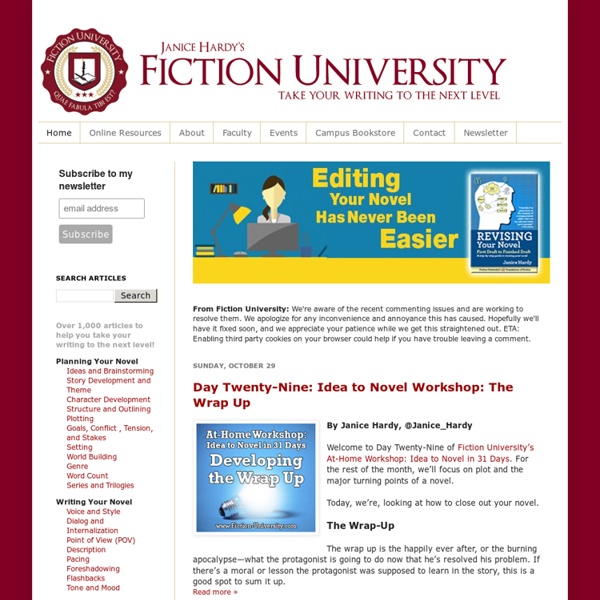



Online Etymology Dictionary Creative Writing Help & Inspiration Cliche Finder Have you been searching for just the right cliché to use? Are you searching for a cliché using the word "cat" or "day" but haven't been able to come up with one? Just enter any words in the form below, and this search engine will return any clichés which use that phrase... Over 3,300 clichés indexed! What exactly is a cliche? This is Morgan, creator of the Cliche Finder. Or, you might like my crazy passion project: Spanish for Nerds: Learning Spanish via Etymologies! Back to cliches... if you would like to see some other Web sites about clichés? © S. Special thanks to Damien LeriAnd to Mike Senter Morgan's Web page
Day Thirty: Idea to Novel Workshop: Summarize Your Novel By Janice Hardy, @Janice_Hardy Welcome to Day Thirty of Fiction University’s At-Home Workshop: Idea to Novel in 31 Days. The only thing left to do is put all your thoughts and ideas into order. Today, we’ll write our working synopsis. Writing a Working Synopsis A novel traditionally has a handful of major moments that make up the turning points of the story’s plot (the set pieces). Defining Story Arcs To help flesh out the working synopsis, look at the various story arcs of the novel. Plot Arcs Plot arcs are how the plot unfolds. Subplot Arcs Subplot arcs show the various aspects of the story and support the other arcs. Character Arcs Character arcs show the emotional growth of the character. Theme Arcs Theme arcs can help tie the other arcs together. Timeline Arcs Timeline arcs focus on when things happen, especially if the novel unfolds over a specific time frame. List the steps for potential arcs in your novel: 1. Don’t forget to list the why on these steps as well. 2. 3. 4. 5.
100 Amazing How-To Sites to Teach Yourself Anything Posted by Site Administrator in Online Learning May 7th, 2009 Learning new skills and expanding your knowledge doesn’t have to cost you an arm and a leg. There are loads of free resources on the Web that can help you find instructional videos, tutorials and classes to learn a wide variety of skills from fixing basic car problems to speaking another language. With 100 sites to choose from, you’re bound to find something here that will help you learn just about anything you could want. General Tutorials These sites offer a wide range of tutorials and videos. Around the House Want to know how to fix that broken cabinet or hang up some great wallpaper? Business and Management If you feel like you’re seriously lacking on business and management skills at work, no need to worry. KnowThis? Language and Writing Those who want to learn a new language, improve their writing skills or just learn more about literature will be well-served by these instructional sites. Technology Math S.O.S. Science Creativity
Writers Write Wonderbook Day Twenty-Eight: Idea to Novel Workshop: The Climax By Janice Hardy, @Janice_Hardy Welcome to Day Twenty-Eight of Fiction University’s At-Home Workshop: Idea to Novel in 31 Days. For the rest of the month, we’ll focus on plot and the major turning points of a novel. Today, we’re focusing on the ending. The Climax The climax is the final showdown with the antagonist. Some Things to Consider About the Climax What constitutes a win for the protagonist? What constitutes a win for the reader? Does it resolve the core conflict of the novel? Does it satisfy the major questions posed in the novel? Is this the ending most readers are hoping for? Key Elements of the Climax The protagonist faces the antagonist directlyThe protagonist proves he’s changed and fully embraces who he is nowA surprise twistA final increase in stakesA sacrifice The climax often has one last increase in stakes, making this final battle matter on a bigger scale. A surprise at the end isn’t mandatory, but endings we can see coming a mile away usually bore us. 1. 2. 3. 4. 5. 6.
Ghostsigns Robin Black How did you become a writer? I took a super circuitous route. Growing up, I wanted to be an actress and a singer, ambitions that I dropped the second I arrived at Sarah Lawrence and saw the theater kids there. They were so sophisticated, so cool, I nearly died of social anxiety, and gave up before I began. (My decision-making skills are not always the best.) In May, 2001, when I was thirty-nine, my father died. Fall 2001, I entered The Rittenhouse Writers group in Philadelphia, and July 2003, I entered the Warren Wilson MFA Program. Name your writing influences (writers, books, teachers, etc.). Allan Gurganus and Steven Schwartz are without question the teachers who have had the greatest influence on me. Authors who have influenced me include Virginia Woolf (of course!) When and where do you write? All the time and all over the house. What are you working on now? Have you ever suffered from writer’s block? That would be 1982-2001. And then, post 2001, it depends how you define it.
Writing Genres As students prepare to write, they need to think about the purpose of their writing: Are they writing to entertain? to inform? to persuade? Setting the purpose for writing is just as important as setting the purpose for reading, because purpose influences decisions students make about form. One of the most important considerations is the genre or form the writing will take: a story? a letter? © ______ 2010, Allyn & Bacon, an imprint of Pearson Education Inc.